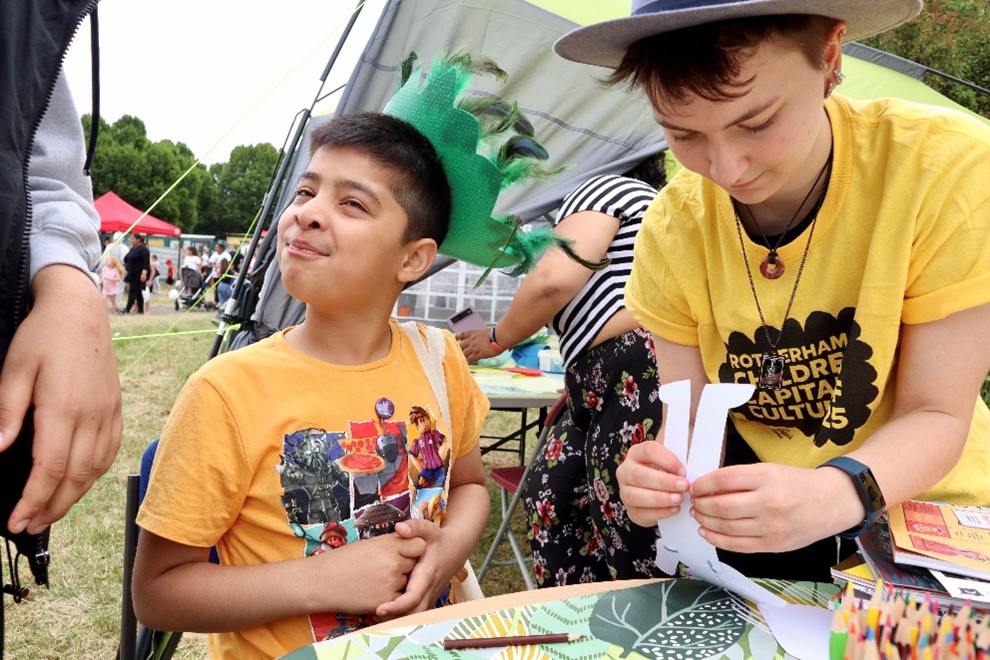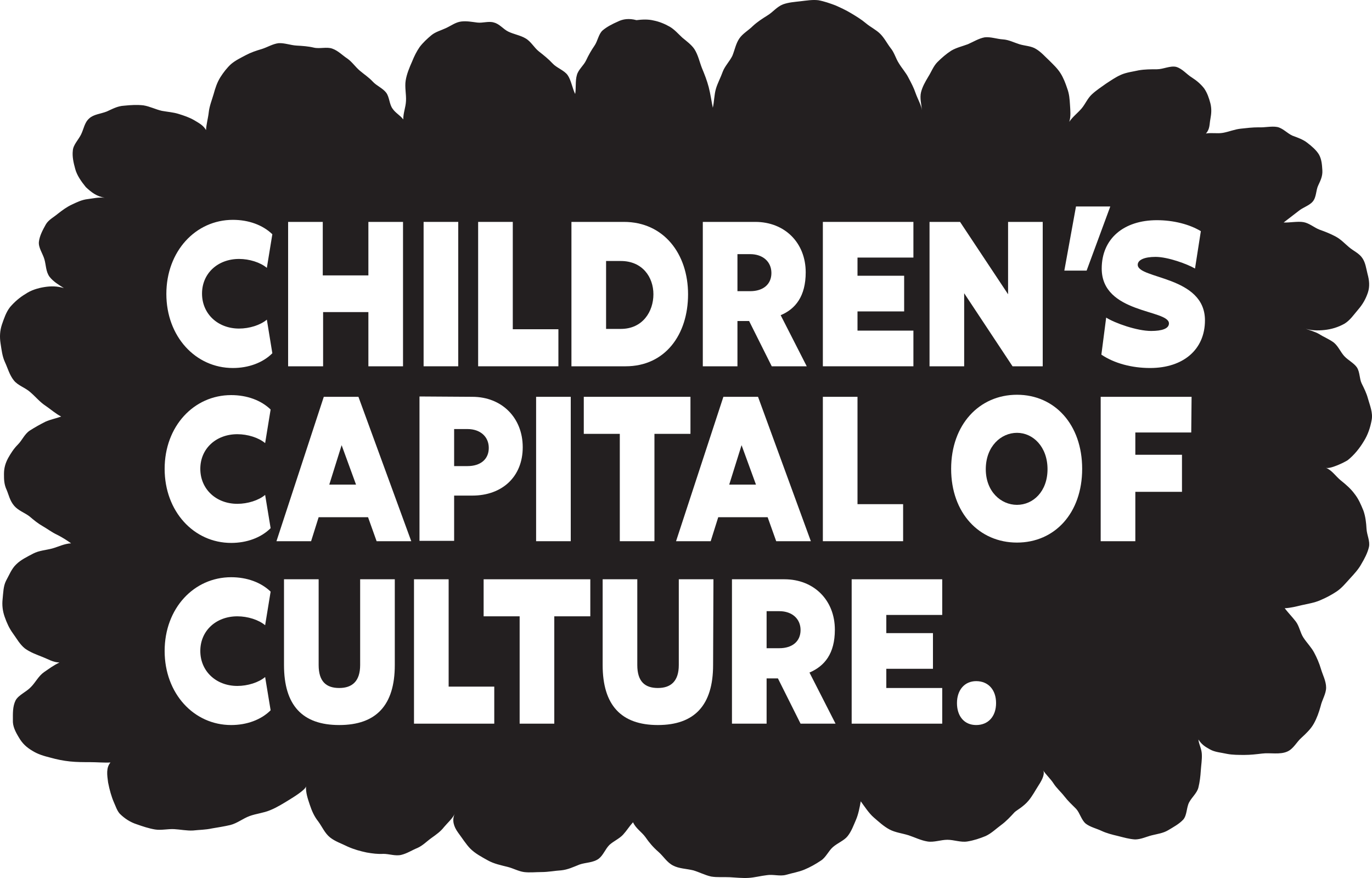How are trainees recruited, and what happens during the traineeships themselves?
Children’s Capital of Culture traineeships are open to 16-to-25-year-olds who either live, work or study in Rotherham.
Children’s Capital of Culture traineeships are either six- or eight-months long, and trainees can be employed on either two or three day a week contracts.
Trainees are paid £12.85 per hour. This is the equivalent of a Band D wage within Rotherham Council and is above the UK Living Wage. Trainees are employed and paid directly by their host organisation; host organisations receive the funding to do this from Children’s Capital of Culture. Trainees are subject to their host organisations’ standard employee policies and regulations, including around employer pension contributions.
Recruitment:
Host organisations do not each individually recruit their own Children’s Capital of Culture trainees. Instead, trainee recruitment happens as a collaboration between all host organisations and the Children’s Capital of Culture team.
The Children’s Capital of Culture team will work with our host organisations to produce promotional materials written in accessible language that are designed to appeal to a 16-to-25 audience, which are then widely shared.
Young people who are interested in the roles then complete a short online application form. On this form, we do not ask for details of applicants’ education or employment histories; instead, we ask questions that aim to get a sense of what the candidate’s creative interests are, why they’re applying for the role, and what they might contribute to the host organisation. Through this process we aim to attract a diverse group of candidates, including talented young people who may otherwise face significant barriers to accessing work and training.
Host organisations and the Children’s Capital of Culture team then meet to shortlist candidates. In previous traineeship callouts we’ve often received 100+ applications, which we normally shortlist to around thirty young people who are invited to a creative recruitment session.
At these half-day creative recruitment sessions, all host organisations give a short presentation so attendees can find out more about the traineeships on offer. The attendees then take part in creative group activities that simulate some of the tasks they might do on their traineeships (for example, planning an event or festival). Finally, attendees complete a short form where they indicate their preferred host organisations.
Immediately following the recruitment sessions, the Children’s Capital of Culture team and host organisations discuss their observations, and based off this decide who they would like to offer traineeship places to. Traineeship places are allocated based on the recruiting team’s assessments, and the applicants’ preferences for where they would like to work.
Often, host organisations will conduct a final telephone or face-to-face interview before offering jobs to successful candidates.
At the very start of their traineeships, all the new trainees will have a half-day induction session together before commencing work with their host organisations.
During the traineeships:
Trainees work directly with their host organisations as a valued employee. They are trainees, and as such it is expected they will – at least initially – have a higher level of support than other new staff might do. However, it is worth noting that they are still “proper” employees of your organisation, and as such are subject to the same policies and procedures!
In some (but not all!) organisations, trainees will spend most of their time working together as a group to devise, plan, deliver and evaluate a single, larger-scale creative activity or event. In other organisations, trainees will have a key role in contributing to a wide variety of creative events, and as part of this take on roles that range from press and marketing, to workshop facilitation, to artistic programming, to community engagement, and more.

Either way, during their employment the trainees will work with their host organisations to plan, deliver and evaluate high-quality events and activities that respond to the needs of our local communities, and that are delivering activities, opportunities and/or events as part of the Children’s Capital of Culture Festival Year
For all Children’s Capital of Culture traineeships, it’s fundamental that trainees can experience a range of roles and activities to develop a rich and varied skillset.
We know that in busy organisations, everyone needs to get stuck in with day-to-day activities (for example, our trainees have done lots of putting up and taking down gazebos at summer festivals this year!), and we encourage trainees to be part of these team efforts. We also know that these are young people who are very early in their career and often have little previous work experience, and as such the level of autonomy and responsibility they have should be commensurate to their position within the organisation.
But in all cases the work the trainees do should be meaningful and diverse, and challenge them to push themselves and extend their skills: these aren’t traineeships where young people spend all their time doing the photocopying and making cups of tea (though we know that photocopying might sometimes happen)!
It is important that most of the activities the trainees are working on are co-produced or co-commissioned between them and their host organisations. This means that the trainees have a meaningful role in making decisions and designing and delivering activities, projects or services. Host organisations should work together with trainees to reach collective outcomes, and truly value their trainees’ input as young people who can advocate for the communities we’re working with.
Finally, it’s important that at least some of the activities the trainees take part in are ones they are given real ownership of, including key responsibility for creative decision-making and planning. It’s important that our trainees gain experience of co-production, but also of taking on leadership roles – and we’ve found from past experience that trainees really rise to this challenge!
Although they’ll each work for their own host organisations, we run regular ‘full cohort meetings’ to allow all the trainees from different organisations to come together. These sessions help the trainees’ build new friendships and benefit from peer support, and enables stronger partnership working between host organisations. These happen no more than monthly (bimonthly or quarterly is more likely!). It’s important all host organisations commit to giving their trainees time to attend these events.
